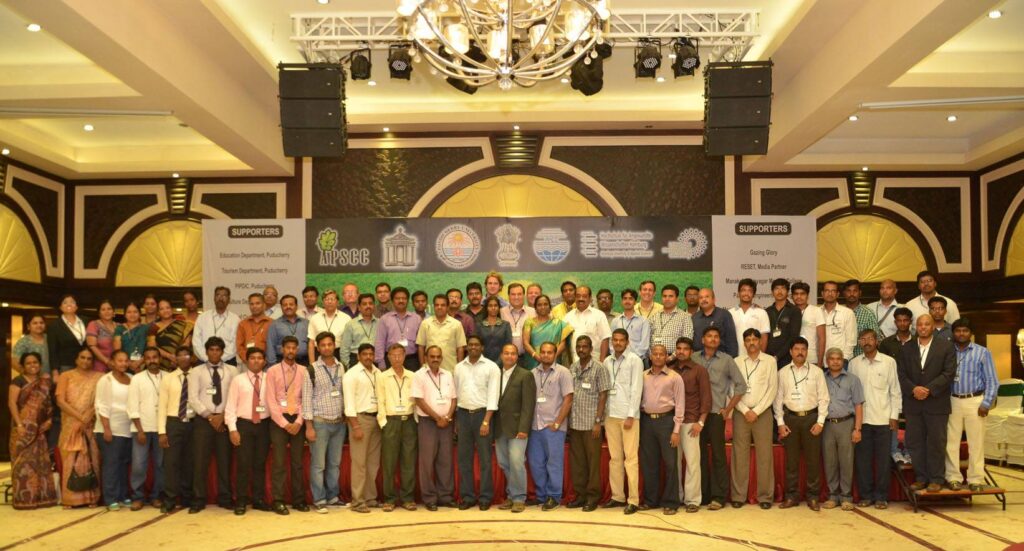
In April 2013, the Association for Promoting Sustainability in Campuses and Communities (APSCC) organized the landmark Green Campus Summit (GCS-2013), held in Puducherry, India. This international event, focused on promoting sustainable practices in higher education, was held under the auspices of prestigious institutions such as the Research and Transfer Centre “Applications of Life Sciences” of Hamburg University of Applied Sciences (Germany), Pondicherry University (India), London Metropolitan University (UK), and the Pondicherry Pollution Control Committee – Government of Puducherry.
A Global Gathering for a Sustainable Future
The Green Campus Summit 2013 brought together over 200 delegates from 12 countries, representing a diverse array of industrialized and developing regions. The summit served as a platform for higher education institutions, government bodies, and industry leaders to engage in meaningful discussions about how campuses can become more environmentally sustainable and serve as models for broader societal change.
The event underscored the importance of integrating sustainability into the academic infrastructure, curriculum, and operations of universities and colleges worldwide. With delegates from across the globe, the summit provided a unique opportunity for cross-cultural exchange of ideas, fostering collaboration among institutions committed to advancing sustainability in education.
Key Themes and Discussions
At the heart of the summit were discussions on a wide range of topics related to green campuses and sustainable practices in higher education. Some of the key themes included:
•Sustainable Campus Design: How universities can adopt green building principles, renewable energy sources, and eco-friendly infrastructure to reduce their environmental footprint.
•Waste Management and Recycling: Strategies for reducing waste, promoting recycling, and creating a circular economy within campuses.
•Sustainability in the Curriculum: How academic institutions can integrate sustainability into their curricula to educate students on the importance of environmental stewardship.
•Community Engagement and Advocacy: The role of universities in promoting sustainability beyond campus boundaries by engaging with local communities and advocating for environmental protection policies.
The diverse set of topics was carefully crafted to highlight not only the environmental challenges faced by campuses but also the innovative solutions that could be implemented to create more sustainable educational environments.
Bridging the Gap Between Developed and Developing Regions
A notable aspect of the Green Campus Summit was the representation of both industrialized and developing regions. The event highlighted how campuses across the world, regardless of their economic status, can adopt sustainable practices. For developing countries, the summit emphasized the importance of low-cost, high-impact sustainability measures, while for industrialized nations, the focus was on integrating cutting-edge technologies and creating scalable models for sustainability.
This global perspective was crucial in fostering a dialogue between countries with varying levels of resources, allowing for shared learning and the identification of practical solutions that can be adapted to different contexts.
Outcomes and Future Directions
The Green Campus Summit 2013 was not just a meeting of minds but a catalyst for future action. By bringing together a diverse group of stakeholders, the summit paved the way for several collaborative initiatives, partnerships, and projects aimed at making campuses greener and more sustainable.
One of the key outcomes was the recognition that sustainability must be embedded in every aspect of campus life – from buildings and energy use to teaching and research. The summit also emphasized the need for ongoing research, knowledge-sharing, and policy advocacy to ensure that the goals of sustainable campuses are not just met but exceeded.
APSCC’s Role in Promoting Green Campuses
As the organizing body, APSCC played a pivotal role in shaping the summit’s success. The association’s dedication to promoting sustainability in education through events like the Green Campus Summit highlights its ongoing commitment to creating a sustainable future for educational institutions and the communities they serve.
The GCS-2013 was a crucial step in APSCC’s mission to drive environmental consciousness and sustainability awareness across educational institutions globally. It reinforced the need for global collaboration, the exchange of best practices, and the continued integration of sustainability into the fabric of university life.
As we move forward, the discussions and collaborations sparked at the Green Campus Summit continue to inspire change in universities around the world. APSCC remains committed to fostering such initiatives, ensuring that educational institutions not only become models of sustainability but also equip the leaders of tomorrow with the knowledge and tools to build a greener, more sustainable world.
